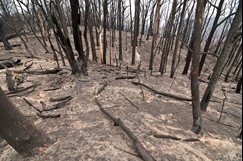 I found the program to be very inspirational, as it included interviews with people who were continuing to rebuild their lives after the absolute devastation of losing family members, their homes and community. Their suffering was palpable, but so was their capacity to be driven by faith, hope and love. They spoke of post traumatic growth which I have recently been reading about, and given some of my own life experiences, this resonates with me. It seems to me we can remain ‘stuck’ and lost in the painful experiences which life throws at us, or we can choose to grow.
I found the program to be very inspirational, as it included interviews with people who were continuing to rebuild their lives after the absolute devastation of losing family members, their homes and community. Their suffering was palpable, but so was their capacity to be driven by faith, hope and love. They spoke of post traumatic growth which I have recently been reading about, and given some of my own life experiences, this resonates with me. It seems to me we can remain ‘stuck’ and lost in the painful experiences which life throws at us, or we can choose to grow.
 I wonder if we are able to imagine a church which accepts post traumatic growth as the way of faith, hope and love. Over the weekend, one of my daughters was listening in on a conversation I was having with one of my other daughters, as we spoke of the arrangements for her son’s baptism. Because of previous circumstances, she was wondering if it was reasonable for her to request an individual celebration. As we spoke the other daughter spoke with conviction saying, “If someone is coming forward and requesting baptism for their child, the church needs to listen and respond, not to get too caught up in their parish rules.” She then went on to say that if they (the church) does not evolve, then it will perish. I thought about our own diocesan theological principle about ‘Reading the Signs of the Times’. I think my daughter’s more hard-line comment reminded me of that. What are the signs of our times and how are we being called by God to respond to these signs? We are certainly facing the threat of ‘extinction’ of the church as we have known it and the emergence of something new.
I wonder if we are able to imagine a church which accepts post traumatic growth as the way of faith, hope and love. Over the weekend, one of my daughters was listening in on a conversation I was having with one of my other daughters, as we spoke of the arrangements for her son’s baptism. Because of previous circumstances, she was wondering if it was reasonable for her to request an individual celebration. As we spoke the other daughter spoke with conviction saying, “If someone is coming forward and requesting baptism for their child, the church needs to listen and respond, not to get too caught up in their parish rules.” She then went on to say that if they (the church) does not evolve, then it will perish. I thought about our own diocesan theological principle about ‘Reading the Signs of the Times’. I think my daughter’s more hard-line comment reminded me of that. What are the signs of our times and how are we being called by God to respond to these signs? We are certainly facing the threat of ‘extinction’ of the church as we have known it and the emergence of something new.
Surely, this is what the Plenary Council is asking of us. You will find published in this Dio Update or in mnnews.today, a report, A Summary of Submissions for our diocese up to December 2018, from the National Centre for Pastoral Research (NCPR). This snapshot shows that we have had 176 submissions from our diocese, coming from 95 groups and 81 individuals. That means that we have had a total of 585 respondents, most of those from Catholics over the age of 50. Across Australia there have been 5,388 submissions from 1,709 groups and 3,679 individuals accounting for almost 42,000 respondents. As I indicated in last week’s message, we have until Ash Wednesday, 6 March, to respond to the question – What do you think God is asking of us in Australia at this time?
There is no lack of information and life experiences to help us respond to this critical question. The universal church is looking to see what emerges as the Australian response to this open-ended dialogue.
Today, Sunday, I proclaimed the first reading at Mass from the Book of Jeremiah (1:4-5, 17-19), a reading I find to be powerful. God calls Jeremiah with the following words:
Before I formed you in the womb I knew you; before you came to birth I consecrated you; I have appointed you as prophet to the nations. So now brace yourself for action. Stand up and tell them all I command you. ………
 I had the good fortune to be invited to the Golden Jubilee celebration of two Sisters of Charity on Saturday, 2 February, the Feast of the Presentation of the Lord. Talk about a powerful witness of the many women at that celebration, who, like Jeremiah, had a sense of being called by God and being consecrated to a life of holiness in imitating Jesus Christ.
I had the good fortune to be invited to the Golden Jubilee celebration of two Sisters of Charity on Saturday, 2 February, the Feast of the Presentation of the Lord. Talk about a powerful witness of the many women at that celebration, who, like Jeremiah, had a sense of being called by God and being consecrated to a life of holiness in imitating Jesus Christ.
In him we were chosen, destined in accord with the purposes of the One who accomplishes all things, according to the intention of his will, so that we might exist for the praise of his glory, we who first hoped in Christ. (Ephesians 1:11)
February 2, 2019, was also the 23rd World Day for Consecrated Life. In his homily for this day, Pope Francis reminds us:
That we too are called to welcome Jesus who comes to meet us. To encounter him: The God of life is to be encountered every day of our lives; not now and then, but every day. To follow Jesus is not a decision taken once and for all, it is a daily choice. And we do not meet the Lord virtually, but directly, we encounter him in our lives, in the concreteness of life. Otherwise, Jesus becomes only a nice memory of the past. When we welcome him as the Lord of life, however, as the centre and the beating heart of everything, then he is alive and lives anew in us. And what happened in the temple also happens to us: around him everything meets, and life becomes harmonious. With Jesus we find again the courage to carry on and the strength to remain firm. The encounter with the Lord is the source. It is important then to return to the source: to retrace in our mind the decisive moments of encounter with him, to renew our first love, perhaps writing down our love story with the Lord. This would be good for our consecrated life, so that it does not become a time that passes by, but rather a time of encounter.
……it blossoms and flourishes in the Church; if it is isolated, it withers. It matures when the young and elderly walk together, when the young rediscover their roots and the elderly welcome those fruits. When we walk alone, however, when we remain fixated on the past or jump ahead in trying to survive, then the consecrated life stagnates. Today, on the feast day of encounter, we ask for the grace to rediscover the living Lord amid a believing people, and to allow the charism we have received to encounter today’s graces.
Pope Francis goes on to explore the twofold nature of this call:
Two young people run to the temple, called by the law; two elderly people moved by the Spirit. What does this twofold call, by the law and by the Spirit, mean for our spiritual life and our consecrated life? It means that we are all called to a twofold obedience: to the law – in the sense of what gives order to our lives – and to the Spirit, who does new things in our lives. And so the encounter with the Lord is born: the Spirit reveals the Lord, but to welcome him we need to persevere every day….. The law and the Spirit go together.
 Bishop Terry Brady, who was the principal celebrant at the jubilee celebration, spoke of the first call of baptism for the Sisters and for each of us and then the renewed call for each of us to encounter Jesus. He spoke of this as the way forward in our church. I think this was reflected in each of the prayers which formed part of the Universal Prayer and in the prayer we were all invited to pray after the two sisters had renewed their vows:
Bishop Terry Brady, who was the principal celebrant at the jubilee celebration, spoke of the first call of baptism for the Sisters and for each of us and then the renewed call for each of us to encounter Jesus. He spoke of this as the way forward in our church. I think this was reflected in each of the prayers which formed part of the Universal Prayer and in the prayer we were all invited to pray after the two sisters had renewed their vows:
We reaffirm our call to life.
May we be strengthened in our commitment
to the way of life we have chosen.
May we be joyful bearers of the Gospel,
and constantly ready to bring the love of Jesus to others.
May we be Church, creating space
where everyone can feel welcomed, loved, forgiven and encouraged.
Amen.
This celebration was a reaffirmation of everyone’s call to life.
Let’s be reminded as we go about our daily tasks that God first called us and we are invited to respond each day – a day of encounter.

